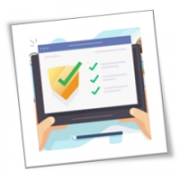Whether your employees are simply searching on Google or accessing online work applications, they’re vulnerable to all sorts of cyberthreats, such as phishing scams and malware. This could endanger your company data and your employees themselves. Therefore, as a business owner, you need to take steps toward helping your employees browse safely.
Install ad blocking software
Even though online ads may seem harmless, they can contain scripts and widgets that send your information to third parties without your knowledge and consent. Ad blocking software will stop banner, rollover, and pop-up ads from appearing on websites. It can also help protect you from accidentally going to malware-laden sites.
Many ad blockers can also disable cookies and scripts used by third parties on sites, block specific items, “clean up” Facebook, and hide YouTube comments.
Prevent browser tracking
In browser tracking, websites monitor your online activity and retain information about the sites you’ve visited. It’s done by placing cookies (i.e., small text files that record everything you do online) on your computer and other devices. Browser trackers not only slow down your computer but can also expose sensitive information to malicious actors.
You can use browser extensions like Ghostery and Disconnect to block cookies from collecting data about your online behavior. It’s also best to utilize your web browser’s built-in private browsing tools, such as Chrome’s Incognito mode or Safari’s Private Browsing. When you use these built-in tools, your browser won’t save details of your browsing session, so it won’t remember your search history, the pages you visited, or your autofill information. This also means your online activities won’t be saved on your device or shared with your other devices.
Use a virtual private network (VPN)
Cybercriminals can intercept data between two parties, allowing them to steal sensitive data, such as login credentials and banking information. A VPN can help solve this problem since it anonymizes your online activity by routing your connection through its secure servers. With a VPN, all of your data traffic gets encrypted and sent via an anonymous IP address. This makes it difficult for hackers to track or intercept your data.
Install antivirus software
Antivirus software is a must for keeping viruses and other malware away from your work PCs, tablets, and smartphones. It will scan your devices for malware and block it if detected, keeping you safe from malicious parties that are after your data.
Make sure to keep your antivirus up to date so it can keep you protected even from the latest cyberthreats. You can enable automatic updates to ensure you’re always running the latest software version.
Train your employees
Provide your employees with security training so they would be aware of the latest scams, know how to recognize cyberthreats, and practice good cyber hygiene. Make sure training sessions also cover your company policies related to data privacy and security, which may include guidelines like:
- Use strong and unique passwords for every account.
- Be wary of clicking on links in emails and opening suspicious email attachments.
- Download software only from legitimate sources.
- Do not store important documents on unsecured devices.
By taking these steps, you can provide a safer online environment for your employees and protect your business from cyberthreats. If you need help implementing these tips, get in touch with our IT experts.
If you are looking for an expert to help you find the best solutions for your business talk to GCInfotech about a free technology assessment
Published with consideration from TechAdvisory.org SOURCE




